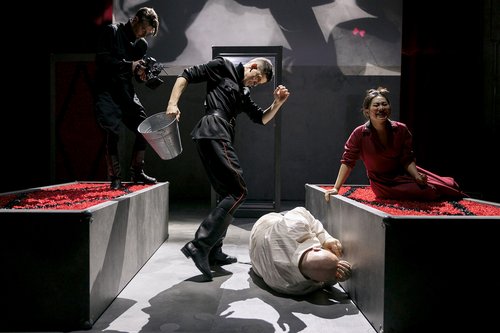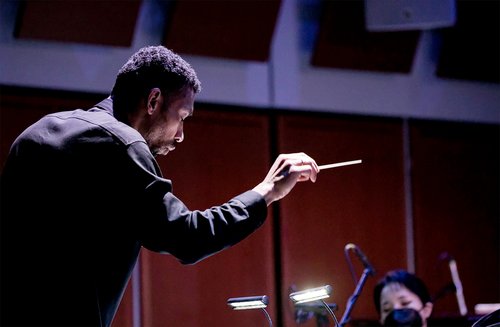Nomadism with PHØNIX16. Courtesy of VOICES Performing Arts Festival
New Voices Call Out in Berlin
VOICES 2024, an international event for the performing arts has opened in Berlin and there will be many performances and events taking place throughout November. This is only its second iteration, yet it has already won over many fans in what is already a culturally saturated art and music scene in the German capital.
The festival’s name reflects its mission – to platform the distinctive and diverse voices of artists and creatives who are looking to find themselves in new places, during these times of powerful cultural and political shifts. Some creatives have left their homeland of their own free will and others have been forced to leave, both in the same tireless search for a sense of identity in a landscape that has changed forever.
Voices is a platform which rests on two pillars, those of music and theatre. In the festival, each of these worlds exist independently and at other times they merge with one another, in collisions which give birth to explosive and cathartic masterpieces of our era. Theatre producer and critic Marina Davydova, and composer Sergei Nevsky are at the helm of the festival, leading their respective disciplines. This synthesis of the arts comes as no surprise to either of them, it has crept up on them over many years. Davydova works as programme director for the drama section of the Salzburg Festival and Nevsky has long been writing for the theatre, notably the score for Maxim Didenko's (b. 1980) critically acclaimed production of the ‘Cremulator’, which will also be shown as part of the Voices festival.
Along with Davydova and Nevsky is the Austrian contemporary academic music ensemble Klangforum Wien which took place in the inaugural festival last in 2023 and again this year has helped to shape the programme. Klangforum Wien consists of two dozen musicians from across numerous different countries and continents, with a broad international repertoire – unsurprisingly its main festival programme is called ‘Tower of Babel’.
The first day of VOICES 2024 was in many ways a manifesto. A loud declaration of the freedom and interconnectivity of the arts spread out over all three floors of a historical space in Berlin’s Kühlhaus, formerly a cold storage. Klangforum Wien, director Philipp Grigorian (b. 1976) and playwright Olga Fedyanina (b. 1966), took over this unique space for the opening night of the festival in a world premiere of ‘Nachspiel’, a grandiose epilogue (Nachspiel is epilogue in German), an allegory of catastrophe, it was a powerful polyphonic multi-dimensional action on the scale of J.S. Bach.
In a dimly lit space, the audience first sees a huge lorry, which appears either to have crashed or been blown up. Set in motion to the sounds of the organ by Klaus Lang, there are body parts which turn out to be almost naked human beings who shaped by suffering. The musicians are seated around the space, enabling the audience to absorb the full volume of sound while walking around the floor. Then the lights go down further, bodies freeze and in an instant the action shifts to the floor above, bringing the audience with it.
Immersive theatre or promenade performance is no new phenomenon. However, usually in such performances it is either the drama or the music that is the main focus, with the other of secondary importance. In Nachspiel this was impossible. For Klangforum Wien, accustomed to experiencing music as the entire performance, this pushed them into a more experimental zone. Philipp Grigorian has staged operas in Russia (memorably ‘Love for Three Oranges’ at the Perm Opera and Ballet Theatre), and across Europe. This year his ‘Xerxes’ based on Handel was performed at the Gießen City Theatre. The additional participation in the performance of playwright Olga Fedyanina, a name by now well established in Europe brought a level of distinct quality for the Austrian players.
Butoh dance, the Japanese art of representing the most complex and sometimes extreme human experiences through movement lay at the heart of ‘Nachspiel’, the choreography created by Vladivostok-born Valentin Tszin (b. 1984) who himself appears in one of the scenes. At first he appears to be a teacher carrying a stack of books, then he is a patient who lies down on an icy steel operating table to the sound of a trumpet that chuckles and growls, shoots and flies in the doctor's hands. Liza Lim's nervous ‘Wild Winged One’ aria sounds. The trumpet falls silent, the patient calms down, he stops moving.
Other scenes take us through what appear to be posthumous flashbacks of an individual’s life: you see a kitchen where borscht is being cooked (a trombone spits out and coughs up Georges Aperghis’s ‘Ruinen’); a room with a rug on the wall and a TV set with a blank screen. Everywhere there are unlikely characters: a bride, a ‘child’, an elderly man whose eyes fill with tears to Salvatore Sciarrino’s ‘Capriccio No. 2’. Eventually everything culminates once again on the ground floor, where the full horror of the road accident is sprinkled with snow and a Christmas tree shines, all tinsel and lights. The musical ensemble moves around the audience, careful a violin bow doesn’t hit you in the eye!. The frenetic optimism of Terry Riley’s ‘1964 In C’ pours out.
The day after ‘Nachspiel’, saw the first part of a trilogy of performances under the title of ‘The Tower of Babel’ which the Klangforum Wien ensemble came up with last year, staging a similar programme again. Yet, while in 2023 the focus was on contemporary composers from Central Asia, this year there is a broader focus on work by composers from across all the territories of the former USSR. This in itself requires pause for thought: is it even appropriate to use the term ‘post-Soviet’ today? What does it mean? And what is it that today unites creatives from such culturally diverse countries like Ukraine, Uzbekistan, Lithuania, Russia, Tajikistan and Belarus?
The musicians of Klangforum Wien heroically tried to answer these tough questions with a four-hour concert in the former St. Elisabeth church. The building, burned down in 1945, was abandoned as ruins for almost half a century before being rebuilt in the 1990s as a cultural space. It featured nine works by nine composers, some of whom were in the audience and during the concert they took part in a public talk called ‘Goodbye, postsocialism?’
During the interval, composer Sergei Nevsky chatted informally with members of the audience, all with drink in hand in a small pop-up bar at the entrance to the former church. Nevsky spoke passionately about uncertainty as being one of the main themes of the festival, but also of the era, as the essence of what is our zeitgeist. He sees it as an uncertainty experienced not only by those cultural figureheads who have just arrived but also by those who have lived for a long time in the context of what used to be, until recently, a seemingly stable Europe.
“People who, like me, have been living abroad, for example, in Berlin for a long time have also found themselves in a situation where they do not know what will happen next. At any moment the government can stop spending money on culture and in some places it has. That is why migration as a theme of the festival becomes a metaphor for the general human condition including that of the artist.”
The theme of migration, explained Nevsky, is the subject of ‘Nomadism’a performance by Slovenian-French composer Vinko Globokar (b. 1934) and Iranian composer Samir TimajChi (b. 1992), and Ilya Moshchitsky’s (b. 1984) performance ‘To Forget’, inspired by Armenian film director Sergei Parajanov and staged in Armenian, and the duo Falak – Denis Sorokin, (b. 1985) and Shokhin Kurbonov – which will present experimental music from Central Asia in the festival.
“Another subject is the attempt to understand how our profession is changing with the growth of artificial intelligence. The notion of copyright is blurring today and it was not when Roland Barthes actually wrote about the death of the author. These challenges are the subject of ‘Drone’ a performance by Dmitry Melkin and a concert called ‘Algos’ by the remarkable Greek pianist Pavel Antoniadis. In Greek ‘Algos’ means ‘pain’, and slightly modified in Arabic, this word formed the basis of the term ‘algorithm’.”
Suddenly, from within the St Elizabeth church there is a loud scraping sound - the musicians of Klangforum Wien have armed themselves with inflatable balloons, whistles and hoses to perform the composition ‘Sun.Disc.Minotaurus’ by Vladimir Gorlinsky (b. 1984). “This is the second time they are playing this piece,” Nevsky explains. “But since the premiere last year, the members of the ensemble are completely different. That is the zeitgeist: everything changes, but something important always remains”.














